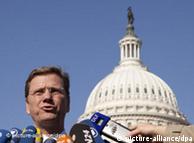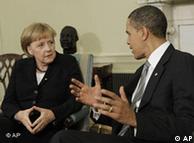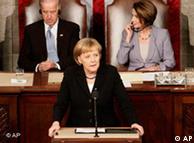Diplomacy | 18.11.2009
Continuity rules in Germany's foreign policy toward the Americas
If there was ever any doubt about who is regarded as Germany's - if not Europe's political heavyweight - in Washington, those doubts were dispelled two weeks when Chancellor Merkel gave her historic address to the US Congress in the wake of her reelection and days before the 20th anniversary of the fall of the Berlin Wall.
And it is not just her personal biography as an East German and the fact that she is regarded as a reliable partner that have won Merkel a lot of praise.
"She is appreciated in the United States also as a mediator on the international stage," Klaus Larres, professor of international relations at the University of Ulster and a Visiting Senior Research Fellow with the US Library of Congress, told Deutsche Welle. "She mediated successfully in a number of summits, European and international economic summits, where she basically pushed heads together and compromise was achieved several times."
After a low point in US-German relations during the tenure of George W. Bush and Gerhard Schroeder, the German chancellor and US President Barack Obama seem to be getting on almost too well, quips Reinhard Rode, professor for German foreign policy at the Martin-Luther University Halle-Wittenberg: "The constant pleasantries from both sides, Obama and Merkel, have been so stark, it's going to be almost impossible to top that," he told Deutsche Welle.
While Merkel's stature is a sign of Germany's importance for the US, it makes it hard for Berlin's novice foreign minister from the market-oriented Free Democratic Party (FDP) to raise his own profile in transatlantic relations. "The vice chancellor and foreign minister in a coalition naturally has to make his mark for his domestic audience, but the possibilities to do that are rather limited," said Rode.
Topics that promise media exposure and issues of political importance over the years have increasingly been taken up by the chancellory, relegating the foreign minister more and more to an administrative role, added Rode.
 Bildunterschrift: Großansicht des Bildes mit der Bildunterschrift: The new German Foreign Minister will try to raise his profile in the US This is especially true for relations with the US, arguably Germany's most important partner next to the EU. With his call for the removal of the remaining American nuclear weapons from German soil, Guido Westerwelle, the country's new foreign minister, has already tried to put an issue on the transatlantic agenda. But, noted Rode, the new foreign minister "will have to learn very quickly how to be a team player and that it is not really clever to try to dinstinguish oneself against the chancellor especially when it comes to relations with the US."
Bildunterschrift: Großansicht des Bildes mit der Bildunterschrift: The new German Foreign Minister will try to raise his profile in the US This is especially true for relations with the US, arguably Germany's most important partner next to the EU. With his call for the removal of the remaining American nuclear weapons from German soil, Guido Westerwelle, the country's new foreign minister, has already tried to put an issue on the transatlantic agenda. But, noted Rode, the new foreign minister "will have to learn very quickly how to be a team player and that it is not really clever to try to dinstinguish oneself against the chancellor especially when it comes to relations with the US."
Making a mark in Afghanistan
Focusing on other countries in the Americas to raise the foreign minister's international profile is not really an alternative, say the experts. First, because relations with other central- and south American countries are largely the domain of the EU and second, because the US simply still remains the most important global power. Therefore, if the new foreign minister wants to make his mark, the Afghanistan conflict, with its many difficult aspects and a joint German-American interest in solving the crisis, might be better suited, explained Rode.
Generally diplomatic relations between Washington and Berlin have been running on a consistent and stable trajectory in recent years that doesn't leave much room to maneuver for newcomers to make a unique impact. On many issues of international importance, Germans and Americans are basically on the same page. On Iran, Merkel again made it clear in her speech before Congress that she agrees with the US that Tehran must not be allowed to aquire nuclear weapons.
On Afghanistan, both partners agree that a military engagement alone will not improve the situation in the country. While the US would still like Germany to contribute more troops to Afghanistan, a compromise seems likely and could look like this: Germany will increase its training efforts for police and military personel in Afghanistan and perhaps also step up its engagement in other non-combat areas. "If the new German government was prepared to help in that endeavor I think that would be greatly appreciated in Washington," explained Larres.
Still, there are a few issues where disagreements between Germany and the US are possible. As far as battling the economic crisis and establishing new guidelines for global financial interactions are concerned, Berlin would like to see Washington take more decisive steps to regulate the financial sector and to curb its budget deficit. On climate policy German politicians have repeatedly criticised the US for its unwillingness to agree to tough measures to fight global warming and they will probably continue to do so. However both issues are unlikely to cause a major disturbance in German-American relations.
Americans would call Merkel
So will the new government and a new foreign minister in place in Berlin have any concrete impact on transatlantic relations at all? "Whether in practical terms the FDP will have any consequences I am not sure," said Larres. "Maybe gradually and over time, but certainly not suddenly."
 Bildunterschrift: Großansicht des Bildes mit der Bildunterschrift: Barack Obama and Angela Merkel agree on many issues In the old coalition with the Social Democrats as in the new government with the liberal democrats, Chancellor Merkel remains the dominant factor in transatlantic relations not just on a German, but also on a European level.
Bildunterschrift: Großansicht des Bildes mit der Bildunterschrift: Barack Obama and Angela Merkel agree on many issues In the old coalition with the Social Democrats as in the new government with the liberal democrats, Chancellor Merkel remains the dominant factor in transatlantic relations not just on a German, but also on a European level.
When Henry Kissinger asked years ago 'who am I going to call if I want to call Europe,' that is still a question which people ask themselves in Washington," explained Larres. "And while that is going to be resolved with the appointment of a so-called European president and foreign minister so far it is largely Merkel the Americans would ring if they need to overcome a crisis or if they need someone who can mediate successfully as far as transatlantic relations are concerned."
Author: Michael Knigge
Editor. Rob Mudge


No comments:
Post a Comment